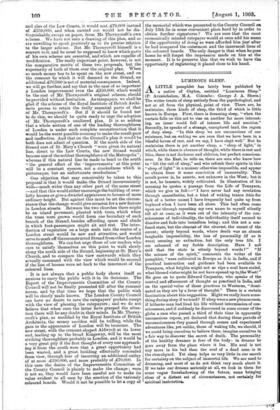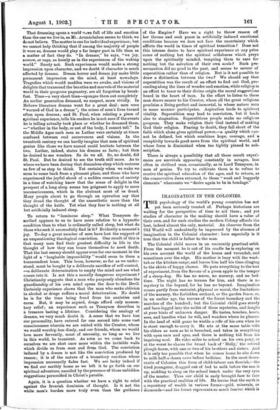LUMINOUS SLEEP. , A LITTLE pamphlet has lately been published by
a native of Ceylon, entitled "Luminous Sleep." (P. Arunochalam, M.A. Colombo : George J. A. Skeen.) The writer treats of sleep entirely from the psychological, and not at all from the physical, point of view. There are, he maintains, three kinds of sleep, the third of which is little known in Europe. First, there is dreaming sleep, "when the curtain falls on this act to rise on another far more interest- ing, an inner world full of intense life and emotion." Secondly, he speaks of a strange, unexplored land, the region of deep sleep. "In this sleep 'we are unconscious of our existence, but on waking we are sure that we have been in a blissful haven of rest, and we say, I have slept well." But he maintains there is yet another sleep, a "sleep of light," in which, while there is absence of thought, while there is rest and bliss, there is not darkness and oblivion, but perfect conscious- ness. In the East, he tells us, there are men who know how to "lift the veil of sleep," and who refresh their spirits in this "sleep of light" in a manner otherwise impossible, and appear to obtain from it some conviction of immortality. This occult power is, he asserts, not unknown in the West; but it is not, he laments, widely cultivated. In illustration of his meaning he quotes a passage from the Life of Tennyson, which we give in full:—" I have never had any revelation through anaesthetics, but a kind of waking trance (this for lack of a better name) I have frequently had quite up from boyhood when I have been all alone. This had often come upon me through repeating my own name to myself silently till all at once, as it were out of the intensity of the con- sciousness of individuality, the individuality itself seemed to dissolve and fade into boundless being; and this not a con- fused state, but the clearest of the clearest, the surest of the surest; utterly beyond words, where death was an almost laughable impossibility; the loss of personality (if so it were) seeming no extinction, but the only true life. I am ashamed of my feeble description. Have I not said that the state is utterly beyond words P" "If the science of the spirit," comments the writer of the pamphlet, "were cultivated in Europe as it is in India, and if practical instruction and guidance had been available to Tennyson, what heights might not so ripe a soul have scaled, what blessed vistas might he not have opened up to.the West!" He goes on to quote Edward Carpenter, who speaks of the control and effacement of thought as practised in India, and on the special value of these practices to Westerns, "domi- nated as they are by a fever of thought." There is a certain fascination about this suggestion. Might we really learn some- thing during sleep if we tried? If sleep were a new phenomenon, if hitherto man had lived his life without intermission of con- sciousness, and if suddenly he discovered in some corner of the globe a race who passed a third of their time in apparently unconscious repose, yet declared that during these periods of unconsciousness they passed through scenes and experienced adventures like, yet unlike, those of waking life, we should, if we could bring ourselves to believe them, imagine ourselves in a fair way to discover the secret of death. The personality of the healthy dreamer is free of the body: in dreams he goes away from the place where it lies. His soul is not any more in his bed than the soul of a dead man. • is in the churchyard. Yet sleep helps us very little in our search for certainty on the subject of immortal life. We are used to dreaming, and most of us do not think very much about it. If we take our dreams seriously at all, we look in them for some vague foreshadowing of the future, some bringing close of a distant set of circumstances, not certainly for spiritual instruction,
That dreaming opens a world full of life and emotion than the one we live in, as Mi. Aruniiclutlam seems to think, we do not believe. The matter is one for individual experience; but we cannot help thinking that if among the majority of people it were so, dreams would play a far larger part in life than as a matter of fact they do. "In dreams," he says, "we joy, sorrow, or rage, as keenly as in the experiences of the waking world." Surely not. Such experiences would make a strong impression upon character, and we doubt if character is much affected by dreams. Dream horror and dream joy make little permanent impression on the mind, at least nowadays. Tragedies which would madden were we awake, and visions of delights that transcend the beauties and marvels of the material world in their gorgeous pageantry, are all forgotten by break- fast. Time—a very short time—sponges them out completely An earlier generation dreamed, we suspect, more vividly. In Hebrew literature dreams went for a great deal: men were "warned of God in a dream"; the crises of men's lives turned often upon dreams; and St. Paul, when relating a piece of spiritual experience, tells his readers he is not sure if the events he is telling actually took place or whether he dreamed them, —"whether in the body, or out of the body, I cannot tell." In the Middle Ages such men as Luther were certainly at times confused between real occurrences and visions. In the twentieth century we can hardly imagine that men of spiritual genius like those we have named could hesitate between the two. Luther, indeed, states his dreams as facts ; but then he desired to see wonders. So do we all. So, no doubt, did St. Paul. But he desired to see the truth still more. As to where we have been during that dreamless sleep which restores us few of us stop to think. Yet certainly when we wake we seem to come back from a pleasant place, and those Who have . experienced the joyful shock of a sudden cessation of anxiety in a time of watching know that the sense of delight in the prospect of a long sleep seems too poignant to apply to mere unconsciousness, which in the abstract most of us dread. Many people about to go through an operation say that they dread the thought of the anaesthetic more than the thought of the knife. Yet what they fear is nothing at all but artificially induced sleep.
To return to "luminous sleep." What Tennyson de- scribed appears to us to have more relation to a hypnotic condition than to what is ordinarily called sleep, but what do those who seek it successfully find in it ? Evidently a moment's joy. To-day a great number of men have lost the support of an unquestioning theological conviction. One result of this is that many men find their greatest difficulty in life in the thought of how they can brace themselves to meet death. That the last enemy should appear even for one moment in the light of a "laughable impossibility "would seem to them a transcendent boon. This boon, however, so far as we under- stand, must be bought by a deliberate sacrifice of self-control, —a deliberate determination to empty the mind and see what comes into it. Is not this a morally dangerous experiment ? Christianity suggests that a man who purposely abandons the guardianship of his own mind opens the door to the Devil. Certainly experience shows that the man who seeks oblivion in alcohol or drugs suffers a moral deterioration. No doubt he is for the time being freed from his anxieties and cares. But, it may be argued, drugs afford only momen- tary relief; an experience such as Tennyson describes is a treasure lasting a, lifetime. Considering the analogy of dreams, we very much doubt it. A sense that we have lost our personality, have entered for one second into some vast consciousness wherein we are united with the Creator, whom we would worship less dimly, and our friends, whom we would love more fervently, must of necessity, so long as we live in this world, be transient. As scion as we come back to ourselves we are shut once more within the invisible walls which divide us from man and from God. The conviction induced by a dream is not like the conviction produced by reason; it is of the nature of a transitory emotion whose impression necessarily fades fast. We are lucky indeed if we find our earthly home as we left it to go forth on our spiritual adventure, unsoiled by the presence of those unbidden suggestions personified in Christ's parable.
Again, it is a question whether we have a right to rebel against the feverish dominion of thought. Is it not the white man's burden more truly even than the guidance I of the Empire ? Have we a right to throw reason off her throne and seek peace in artificially induced emotional conditions because we dare not face the uncertainty which afflicts the world in times of spiritual transition ? Does not this intense desire to have spiritual experience at any price come of nothing but the spiritual selfishness which preys upon the spiritually minded, tempting them to care for nothing but the salvation of their own souls? Such pre- occupation did no good in the past, and seems to savour of superstition rather than of religion. But is it not possible to draw a distinction between the two? We should say that superstition was the result of an effort to find out God, pro- ceeding along the lines of wonder and emotion, while religion is an effort to trace to their divine origin the moral suggestions heard in the heart orinan. In the effort to listen to these man draws nearer to his Creator, whom all the great religions proclaim a Being perfect and immortal, in whose nature man in some manner participates. Aspiration leads to spiritual vitality. Superstition may lead to conviction, but it leads also to stagnation. Superstitious people make no religious progress. They make religion their God instead of making God their religion. Fearing to doubt, they fall short of the faith which alone gives spiritual power,—a quality which can. not be defined, but which combines hope, courage, and a receptivity towards good news from the spiritual world, and whose force is diminished when too tightly pinned to sub. scription.
There is always a possibility that all these occult experi- ences are survivals appearing constantly in savages, less often in civilised man, occasionally, as in Lord Tennyson, in men of genius. To try to cultivate them is to refuse to receive the spiritual education of the ages, and to return, as the conservative Jews returned, to those "weak and beggarly elements" whereunto we " desire again to be in bondage."







































 Previous page
Previous page